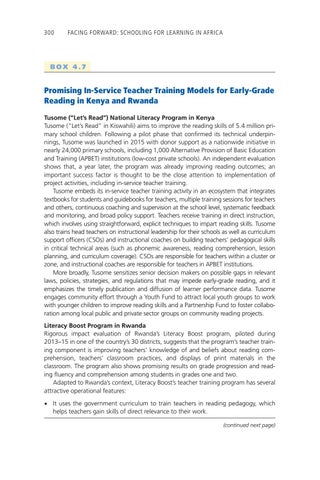300
FACING FORWARD: SCHOOLING FOR LEARNING IN AFRICA
BOX 4.7
Promising In-Service Teacher Training Models for Early-Grade Reading in Kenya and Rwanda Tusome (“Let’s Read”) National Literacy Program in Kenya Tusome (“Let’s Read” in Kiswahili) aims to improve the reading skills of 5.4 million primary school children. Following a pilot phase that confirmed its technical underpinnings, Tusome was launched in 2015 with donor support as a nationwide initiative in nearly 24,000 primary schools, including 1,000 Alternative Provision of Basic Education and Training (APBET) institutions (low-cost private schools). An independent evaluation shows that, a year later, the program was already improving reading outcomes; an important success factor is thought to be the close attention to implementation of project activities, including in-service teacher training. Tusome embeds its in-service teacher training activity in an ecosystem that integrates textbooks for students and guidebooks for teachers, multiple training sessions for teachers and others, continuous coaching and supervision at the school level, systematic feedback and monitoring, and broad policy support. Teachers receive training in direct instruction, which involves using straightforward, explicit techniques to impart reading skills. Tusome also trains head teachers on instructional leadership for their schools as well as curriculum support officers (CSOs) and instructional coaches on building teachers’ pedagogical skills in critical technical areas (such as phonemic awareness, reading comprehension, lesson planning, and curriculum coverage). CSOs are responsible for teachers within a cluster or zone, and instructional coaches are responsible for teachers in APBET institutions. More broadly, Tusome sensitizes senior decision makers on possible gaps in relevant laws, policies, strategies, and regulations that may impede early-grade reading, and it emphasizes the timely publication and diffusion of learner performance data. Tusome engages community effort through a Youth Fund to attract local youth groups to work with younger children to improve reading skills and a Partnership Fund to foster collaboration among local public and private sector groups on community reading projects. Literacy Boost Program in Rwanda Rigorous impact evaluation of Rwanda’s Literacy Boost program, piloted during 2013–15 in one of the country’s 30 districts, suggests that the program’s teacher training component is improving teachers’ knowledge of and beliefs about reading comprehension, teachers’ classroom practices, and displays of print materials in the classroom. The program also shows promising results on grade progression and reading fluency and comprehension among students in grades one and two. Adapted to Rwanda’s context, Literacy Boost’s teacher training program has several attractive operational features:
•
It uses the government curriculum to train teachers in reading pedagogy, which helps teachers gain skills of direct relevance to their work. (continued next page)
